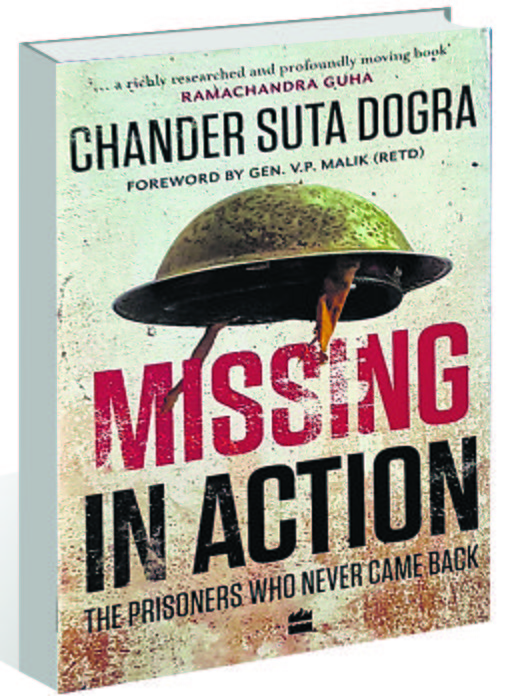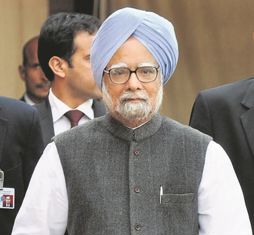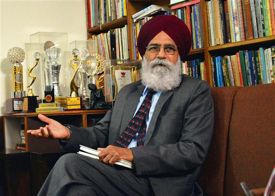Missing In Action: The Prisoners Who Never Came Back by Chander Suta Dogra. Harper Collins. Pages 339. Rs 699
Book Title: Missing In Action: The Prisoners Who Never Came Back
Author: Chander Suta Dogra
Lt Gen Baljit Singh (Retd)
PHILIP MASON was a fresh entrant to the Indian Civil Service when he assumed duty as the District Magistrate at Almora in the mid-1930s. As was the custom in those days, Mason paid a courtesy “call” to the Army Officers Mess which, unbeknown at the time, would inspire him to author A Matter of Honour, a persuasive history of the evolution of the Indian Army, which emerged victorious from battles and wars globally, again and again, against the finest opponents.

that the MIA were undoubtedly Prisoners
of War in Pakistan.
Mason conceptualises that the winning habit of the Indian Army rests squarely upon its unwritten credo of “Fidelity to an oath, loyalty to comrades and courage under stress. Without these virtues, an Army is nothing”. Of course, he had no idea that shortly the Army’s two younger siblings, Air Force and Navy, would adopt the very same credo and the trio today would stand sworn to a common oath:
“I... hereby solemnly affirm that I will be true in faith and allegiance to the Constitution of India... observe and obey all commands... even at the peril of my life.” Likewise each jawan, airman and rating affirms: “Main bhagwan ko sakshi maan kar shapath leta hoon ki.....aagya ka palan karunga, isme chahe mujhe apna jiwan bhi balidan karna pade”.
Inherently, this credo and oath demand that unmindful of odds, no soldier deserts his post and no commander from the lowliest in the bunker to the supreme commander will abandon a single soldier, in life or in death, and will track and bring home the “Missing in Action” (MIA), even if traced in captivity of the adversary.
After the 1971 India-Pakistan War, the Government of India had listed 54 soldiers MIA, all from the Western Front and presumed to be in Pakistan’s captivity. Unfortunately, that figure and status remain unaltered till the present times. So, understandingly, Chander Suta Dogra’s book is commendably focused on the emotional and psychological trauma that family members of the MIA have been enduring every day for the past 50 years. Is he dead? Is he alive, tortured and unhinged? There is no answer.
But more appropriately, the book is a damning indictment of the Indian state which ipso facto is the implied but admittedly non-signatory, contracting party of the soldier’s oath of allegiance. After all, each of the MIA had plunged in to the clash of arms signalled by the State, whether on terra firma in Chhamb or the skies above “even at the peril of my life” and “isme chahe mujhe apna jiwan bhi balidan karna pade”. And to the question as to why would a soldier be so unmindful of the consequences, Mason’s unequivocal view was that it is simply a “Matter of Honour” for the soldier!
Clearly, the State has failed in its statutory obligation to the soldiers by not mounting a dedicated mission for bringing to closure the searing issue of the MIA in Pakistan’s captivity. The book is abounding in irrefutable leads to suggest that the MIA were undoubtedly Prisoners of War (PoW) in Pakistan, vividly revealed by the Time magazine of December 27, 1971, with a photograph of two Indian MIAs peering through the bared door of a prison. One of them was unmistakeably Major AK Ghosh of 15 Rajput. Time should have been approached to reveal the location of the prison, besides much else to pin down Pakistani denials.
Similarly, Major AK Suri of 5 Assam wrote a very hurried letter to his father in mid-June, 1975, from Karachi (presumably jail) and succeeded in having it smuggled out. The MEA had the handwriting examined forensically and declared it authentic. Similarly, the US Defence Adviser at Islamabad, Col Chuck Yeager of USAF was on record that he had met 20 IAF Pilots (PoWs) in various Pakistani jails. Clearly, he would have known the places of their detention but India failed to pursue this vital lead too.
No nation gives up the search to bring home their MIA, in person or their remains. The US persists to this day to locate their MIA from World War II (from Arunachal in 2009!), Korean War and the Vietnam War. Similarly, Israel showed no hesitation in swapping 7,000 Palestinians for just 16 Israeli soldiers, states the book. We, on the other hand, according to Dogra, rejected Pakistani formulation of swapping each Indian MIA for three Pakistanis in India’s custody.
Putting all this aside, there are several names on the MIA list who, according to first-hand eye witness reports, had perished in action. For instance, Sqn Ldr VK Bhatia saw Flt Lt VS Tambay’s aircraft “...spew out thick black smoke... Tambay did not attempt to eject... saw the aircraft crashing”. Similarly, Capt Kamal Bakshi, when last seen, had “...lunged towards the approaching enemy tanks with a blazing sten gun ... his body was never found.” It is as clear as daylight that one of the tank shells hit the gutsy Kamal at almost point blank distance and his body simply dissolved into ether.
We know that in quest of total defeat of the adversary, there simply has never been any modicum of morality and fair play or adherence to related Geneva Conventions, except in the imagination of philosophers. The author provides the episode of Maj AS Malik’s platoon having blundered into ambush and the enemy “not only killed them all but also mutilated Malik’s private parts.” Here, Dogra deserves much applause for bringing to light, in the epilogue, similar plight of Pakistan army sepoy Maqbool Hussain, taken PoW in August 1965. When repatriated 40 years later in September 2005 at Wagah Border, “this seemingly happy soldier” was found incoherent because of trauma from his severed tongue.
Maybe it is time to shed the paradigm that “all is fair in love and war” in deference to Shelley’s sage counsel:
O cease! Must hate and death return?
Cease! Must men kill and die?...
The world is weary of the past,
Oh, might it die or rest at last!”














